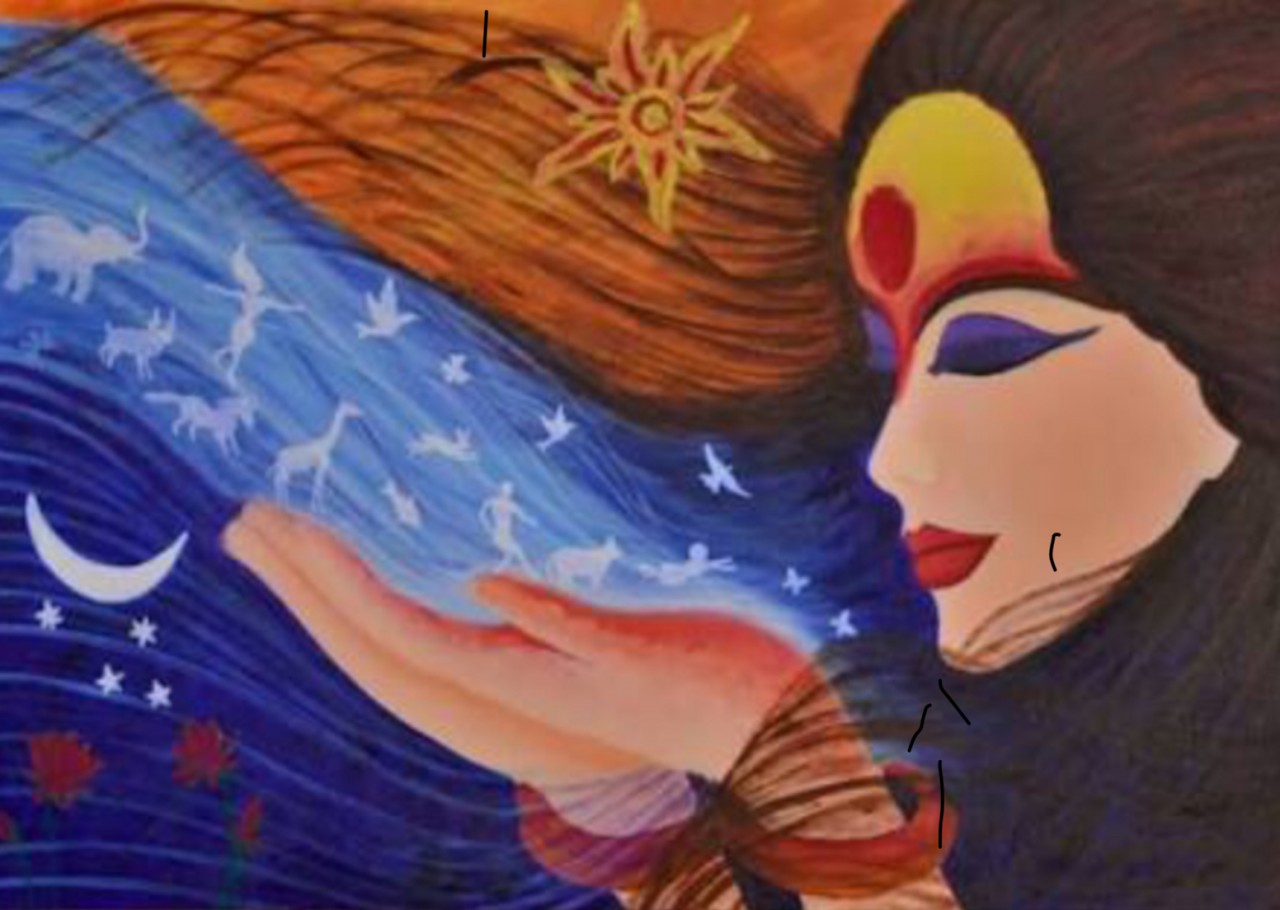// Mata Bhoomi Putroham Prithivyah //
Atharva Veda, Prithvi Sukta, Shloka 12
Is a solemn declaration of filial allegiance to Mother Earth by humankind, her offspring.
Shloka 34: seeks forgiveness: whatever I may dig from thee, O Earth, may that have quick recovery again. O purifier, May we not injure thy vitals or thy heart.
When I was in pre-college years, I'd go to the community science center library for reading. A poster on the walls of the library is clearly etched into my memory yet ...it said..
The Earth is our mother, the sky our father, we in between are their children. We humans: are the spoiled children of such divine parents. We take for granted their resources without giving back. We are in disconnect from the source of our food, our energy, our reality of the planet. While farmers starve and hang themselves due to unpaid debts in rural areas, urban city dwellers are plagued with the problem of plenty and obesity of epidemic proportions. We exploit our mother's kindness and expect her to keep giving till she's bled to illness and eventually dies out. We spew venomous toxins into the very air we breathe. We steal from mother nature without ever a return gift to her. (In)Humans have given ourselves undisputed rights over animals and nature because we have the greed and capability for insensitivity to exploit these. The Isa Upanishad states that Earth bears fruit for her children and expects the fruits to be a final offering to the supreme. Then is she satisfied. Instead we have limited the benefits of earth's bounty to serve only our unlimited selfish inhuman wants. We have made industries of all of nature's gifts, and continue to burden the resources of our planet with unbridled wanting, rampant overpopulation and pilfered what not in the name of religion.
Ancient Vedic culture lived as one with nature which meant not only respecting and living within the laws of natural environment but also protecting these. The Sun, Moon, stars, air, animals, rivers, oceans, trees, birds, mountains ...all are considered one in consciousness. All jivatma(individual soul) are but a part of the Paramatma(supreme consciousness); All are interconnected; All nature is divine and divinity is found in nature. A yogi is one with nature: his/her own and the nature of the environment. S/he knows of these as one and the same. The Vedantic truth of 'Sarvam khalvidam Brahman' means that everything is Brahman. As part of the Vedic experiential knowledge system, Ayurveda and Yoga totally complement nature and their principles and practices are in sync with the natural rhythms of the consciousness of all creation. The Vedic message is that Nature and the environment are to be viewed holistically and each entity and constituent is carefully preserved with reverence. The hymns of the Vedas are offered to deities who are embodiments of fire, water, wind, the five elements and many more which pertain to nature. Thus the Vedic way is to worship nature and protect the environment.
Ecological balance and weather cycles are influences of planets, stars, the moon and sun. Even as of now, sowing and harvesting in most of India happens as per the Sun, star and moon alignments: Traditionally, a mantra of thanks is offered while seeking forgiveness from the plant too. The rivers and earth, animals and trees are also viewed as sacred. Even mountains are considered to be a part of the 8.4 million lifebirth cycle. There is no land holier than the land that feeds us and no water body holier than the one that quenches our thirst. The Varāha purana recommends each person to plant one each of neem, peepul, banyan trees; two each of pomegranate and orange trees, five mango trees and any ten flowering shrubs(incl. creepers) to salvage their human soul. Planting of trees and digging of wells are paramount charity..many ancient trees dot waysides of old Indian routes where solace is sought in their shade. The tired travellers surely must be offering thankful prayer of gratitude to the one who thoughtfully provided the moments of refuge.
As ordained in the Vedic code, Vanaprastha ashram is the third of the four stages of life and one is expected to spend time in forests called tapovan(tapa=penance + Van=forest) during this phase of life to contemplate the meaning and purpose of human existence. Thus, forests are integral to the Vedic system. There also used to exist a part of the forest designated to nature only. Humans were prohibited from entering as this was to be kept only for the animals to ensure their 'Raksha/protection'; Besides, of course humans creating imbalance in the forests' ecosystem. There couldn't be a truer way to respect the forest and its legal inhabitants. The Rig Veda 8.1.13 clearly advocates protecting the forests. Each village had at its periphery, its very own small forest or shri-van: sacred groves with medicinal plants. Some still exist in remote tribal belts but are under grave threat due to proselytism that has converted tribals from natural living to religious thought and thence lost connection with the way of sanctuary living. Almost 93% of Ayurvedic herbs are now on endangered lists due to such loss.
Somewhere along the way, we lost this respect for natural living to modern scientific rationale which came in with the medieval era of world colonisation, disdain for the organic nature worshiping ways of natives and exploitation of the resources of the colonies. Insistence on validation by barely evolved western scientific experimentation takes precedence over the experiential science that was inherited from the ancient seers. While we claim that our lives have been greatly improved by science, we are possibly the most emotionally bereft and miserable generation that Mother Earth has borne.
As we sow, shall we reap. We planted plastic and toxins; today, they have come back at us manifold as disease and environmental disasters. Our generation has been fortunate enough to know what old world methods were and can clearly see where the current trends have rapidly raped earth of her natural environment. We have a choice: leave behind an inheritance of loss for future generations or turn around to natural ways by simplifying our demands from the now limited resources of our planet.
Could we make an effort to relearn to revere nature? We have injured the vitals and the heart of our Mother Earth. Will we continue as human'kind' or human'cruel' children?



